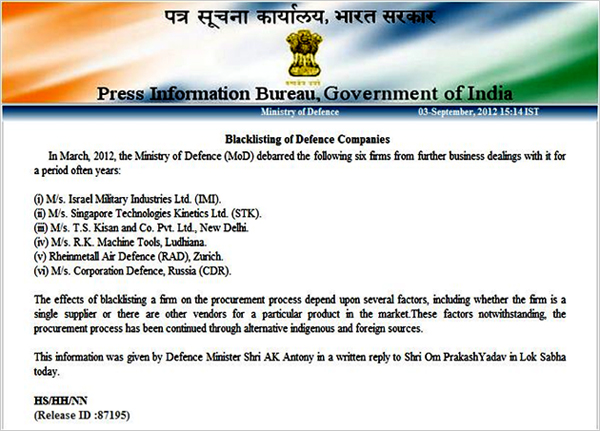INTERIOR and Local Government Undersecretary Rico E. Puno and three others visited in May the main facility of an Israel-based firm that has been blacklisted by the Indian defense ministry early this year for engaging in corrupt practices.
An Aug. 8 confidential memorandum addressed to now-deceased DILG secretary Jesse Robredo revealed that Puno, together with former director of the Philippine National Police Special Action Force Leocadio Santiago, Ramiro Lopez III, an observer for the bids and awards committee, and Reynaldo Espineli, president of R. Espineli & Co., left the country on May 10 to accept the tour invitation of Israel Military Industries (IMI). Espineli is IMI’s local partner.
The 16-page memo noted that Puno’s group left the country on the same day that the second pre-conference for the procurement of 1,500 assault rifles happened. The presence of conflict of interest “might impair the integrity of the bidding process,” the memo concluded. ABS-CBN News has uploaded a copy of the in its Website.
Puno and a group of police officers went to Robredo’s condominium unit in Quezon City on Aug. 19, a day after the interior secretary was reported missing.
President Benigno Aquino III, speaking to reporters at the sidelines of the Asia Pacific Cooperation summit in Vladivostok, Russia last Saturday, clarified that it was he who had ordered Puno to seal Robredo’s office “to ensure that all of these records will be left intact.” “That is the extent of the instructions that I gave to him,” Aquino added.
The Senate and the House are set to investigate the transaction. Deputy Director General Emelito Sarmiento, chair of the PNP Bids and Awards Committee, told a TV newscast Monday night that no one in the Puno delegation was part of his committee.
“As Undersecretary for Peace and Order, he (Puno) can always sit down, but not as voting member, not as regular member. Wala ho siyang dinidikta sa amin (He dictated nothing to us) ,” Sarmiento said.
IMI, a company fully owned by the Israeli government, counts among its clients the Israel Defense Forces, the United States military and member-countries of the North Atlantic Treaty Organization. A May 2012 report by the wire agency United Press International (UPI) listed IMI as one of the four leading exporters of military hardware in the said West Asian country for 2010.
In March of this year, the Indian Defense Ministry blacklisted IMI and five other international weapons manufacturers after a former high-ranking defense official was charged by the country’s Criminal Bureau of Investigation for accepting “illegal gratification,” the rough equivalent of receiving bribes, according to a website about Indian laws.
Debarred were:
- M/s. Israel Military Industries Ltd. (IMI)
- M/s. Singapore Technologies Kinetics Ltd. (STK)
- M/s. T.S. Kisan and Co. Pvt. Ltd., New Delhi
- M/s. R.K. Machine Tools, Ludhiana
- Rheinmetall Air Defence (RAD), Zurich.
- M/s. Corporation Defence, Russia (CDR)
UPI reported that the six firms are prohibited from doing business with India’s defense department for 10 years.
The official involved in the case is Sudipta Ghosh, former director general of the Indian Ordnance Factories Board (OFB), a government-run arms manufacturer under the supervision of the Indian Ministry of Defense.
India’s defense ministry confirmed the debarment of the six firms in a statement released by the country’s Press Information Bureau last Sept. 3.
A month after the blacklisting, the Indian government confiscated a $70 million bank guarantee from IMI. The move came as a result of the firm’s alleged violation of a so-called “integrity agreement” related to an arms, the Israel National News reported last April.
Since 2005, the government of India has required all foreign arms manufacturers to make a pledge that they will not engage in “unfair and unethical” means to win procurement deals.
Exporting weapons for law enforcement and military purposes is a billion-dollar industry in Israel (earning $7.6 billion in 2010 alone), the UPI reported in May 2012. The report specifically mentioned India’s decision to bar IMI from doing business with their defense ministry for 10 years, noting that the punishment “could have an impact on (Israel’s) defense exports.”
It went on to add that the export division of Israel’s defense ministry “has been involved in dubious arms sales to unsavory regimes through shady weapons dealers.” Curiously, Puno’s group went ahead with their trip to the IMI facility even if the company has been dragged in an international controversy just a month before.
Timeline of the failed bidding
Puno and his companions returned to the country on May 20 from their sojourn to Israel. Five weeks after that (June 28), the consortium of Israel Weapons Industries (IWI) and R. Espineli Trading Co. won the public bidding vis-à-vis PNP’s purchase of 60,000 caliber 9mm pistols.
The consortium’s offer of 60,000 Jericho 941 PL pistols for P973.6 million bested the bids made by three other entities. The president of R. Espineli had joined Puno in the trip. IWI used to be part of IMI prior to its 2005 acquisition by SK Group, which describes itself as one of the leaders in the global defense and security industry.
Despite winning the bidding war, the PNP BAC eventually disqualified R. Espineli Trading-Israel Weapons Industry after it failed to submit a certificate of bid security from the Insurance Commission and another certificate authenticating the translation of foreign documents from the Philippine embassy in Israel.
Aside from that, the Aug. 8 DILG memo stressed that the company’s products “appeared” to have failed in the actual tests and evaluations done by PNP. The consortium of Trust Trade and Glock Asia Pacific, which submitted the second lowest bid, was then considered for the contract.
On Monday, Agham party-list Rep. Angelo Palmones said Puno approved the deal with Trust Trade and Glock Asia Pacific on Aug. 31, the day the President appointed Manuel “Mar” Roxas II as interior secretary.
